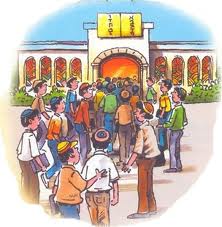Pentecost – Shavuot

The Torah was given by G‑d to the Jewish people on Mount Sinai more than 3300 years ago. Every year on the holiday of Shavuot we renew our acceptance of G‑d’s gift, and G‑d “re-gives” the Torah.
The word Shavuot means “weeks.” It marks the completion of the seven-week counting period between Passover and Shavuot.
The giving of the Torah was a far-reaching spiritual event—one that touched the essence of the Jewish soul for all times. Our sages have compared it to a wedding between G‑d and the Jewish people. Shavuot also means “oaths,” for on this day G‑d swore eternal devotion to us, and we in turn pledged everlasting loyalty to Him.
On this day G‑d swore eternal devotion to us, and we pledged everlasting loyalty to Him The holiday of Shavuot is a two-day holiday, beginning at sundown of the 5th of Sivan (May/ 24/2015) and lasting until nightfall of the 7th of Sivan (May/25/2015). (In Israel it is a one-day holiday, ending at nightfall of the 6th of Sivan.)
Shavuot customary
Adorning the Home with Greenery & Flowers
Since Shavuot is also called the “Harvest Festival,” it is customary to adorn the home and synagogue with fruits, flowers and greens. Furthermore, our Sages relate that although Mount Sinai was situated in a desert, when the Torah was given the mountain bloomed and sprouted flowers.
Candle light
Women and girls light holiday candles to usher in the holiday, on both the first and second evenings of the holidays.
"Bless are you, Lord our, G-d, King of the universe, who has sanctified us with his commandments, and commanded us to kindle the Yom Tov light".
"Bless are you, Lord our, G-d, King of the universe, who has granted us life, sustained us and enabled us to reach this occasion".
Shavuot night learning
On the first night of Shavuot (this year, Saturday, May 26/2012), Jews throughout the world observe the centuries-old custom of conducting an all-night vigil dedicated to Torah learning and preparation for receiving the Torah anew the next morning. One explanation for this tradition is that the Jewish people did not rise early on the day G‑d gave the Torah, and it was necessary for G‑d Himself to awaken them. To compensate for their behavior, Jews have accepted upon themselves the custom of remaining awake all night.
The Ten Commandments
The holiday of Shavuot is the day on which we celebrate the great revelation of the giving of the Torah at Mount Sinai, 3,327 years ago. You stood at the foot of the mountain. Your grandparents and great-grandparents before them. The souls of all Jews, from all times, came together to hear the Ten Commandments from G‑d Himself.
All men, women and children should go to the synagogue on the first day of Shavuot to hear the reading of the Ten Commandments.
This year, on Sunday, May 24/2015, go to your local synagogue to hear the Ten Commandments and reaffirm the covenant with G‑d and His Torah.
Since we all stood at Mount Sinai, we must all reaffirm our commitment. Babies, young children, the elderly, all that are able should attend.
Eating Dairy Foods
is customary to eat dairy foods on the first day of Shavuot. There are a number of reasons for this custom. Here are a few:
-
On the holiday of Shavuot, a two-loaf bread offering was brought in the Temple. To commemorate this, we eat two meals on Shavuot—first a dairy meal, and then, after a short break, we eat the traditional holiday meat meal.
-
With the giving of the Torah, the Jews became obligated to observe the kosher laws. As the Torah was given on Shabbat, no cattle could be slaughtered nor could utensils be koshered, and thus on that day they ate dairy.
-
The Torah is likened to nourishing milk. Also, the Hebrew word for milk is chalav, and when the numerical values of each of the letters in the word chalav are added together—8 + 30 + 2—the total is forty. Forty is the number of days Moses spent on Mount Sinai when receiving the Torah.
-
When Moses ascended Mount Sinai, the angels urged G‑d to reconsider His decision to give His most precious Torah to earthly beings. “Bestow Your majesty upon the heavens . . . What is man that You should remember him, and the son of man that You should be mindful of him?” (Psalms 8:2–4). One of the reasons why the angels’ request went unheeded is because of the Jews’ meticulous adherence to the laws of the Torah—including the kosher laws. Not so the angels, who when visiting Abraham consumed butter and milk together with meat (Genesis 18:8). On Shavuot we therefore eat dairy products and then take a break before eating meat—in order to demonstrate our commitment to this mitzvah.
Yizkor
On the second day of Shavuot, the Yizkor memorial service is recited.
The Book of Ruth
Some communities read the Book of Ruth publicly, as King David—whose passing occurred on this day—was a descendant of Ruth the Moabite.
The Book of Ruth is recited as part of the program of study for Shavuot night. Additionally, in many synagogues it is read publicly on the second day of Shavuot. There are several reasons for this custom:
A) Shavuot is the birthday and yahrtzeit (anniversary of passing) of King David, and the Book of Ruth records his ancestry. Ruth and her husband Boaz were King David’s great-grandparents.
B) The scenes of harvesting described in the book of Ruth are appropriate to the Festival of Harvest.
C) Ruth was a sincere convert who embraced Judaism with all her heart. On Shavuot all Jews were converts—having accepted the Torah and all of its precepts.